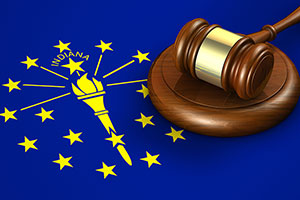A man convicted of stalking a woman by sending her Facebook messages from several different accounts complained on appeal that a police officer should not have been allowed to give expert testimony linking him to the Facebook messages. The Indiana Court of Appeals concluded that the officer’s expert testimony was properly admitted.
Facts of the Case
Christopher Johnson met a woman identified as D.K. in 2012. He repeatedly contacted her by means of telephone calls, texts, and social media. D.K. did not welcome Johnson’s attention and asked him to stop. When he did not, D.K. obtained a protective order that prohibited further contact. She obtained the order in May 2014 but the contact continued.
Johnson went to D.K.’s home in 2015. When he was arrested for violating the protective order, he denied that he knew the order existed. The police then served him with the order and released him.
Johnson went to D.K.’s home twice after being served with the protective order. On the second occasion, Johnson was arrested. He was charged with multiple counts of stalking for visiting D.K.’s home, for texting her, and for sending Facebook messages both before and after the protective order was entered.
Expert Testimony
The Facebook messages were sent to D.K. from several accounts. The prosecution alleged that the accounts all belonged to Johnson, who opened them using false identities.
To prove that claim, the prosecution offered the expert testimony of Sergeant Steven Schafer, a member of the Computer and Digital Forensic Unit of the Indianapolis Metropolitan Police Department. He testified as an expert in “forensic analysis of social media records and digital trails.”
The defense objected that Schafer was not qualified to link Johnson to the Facebook accounts. The trial court overruled that objection and permitted Schafer to testify.
Schafer testified that he attributed five Facebook accounts to Johnson that were not in Johnson’s name. He concluded that the accounts belonged to Johnson because each account user logged into Facebook from the same IP address. In addition, each account was associated with the same “cookie” on Johnson’s computer. Those facts caused Schafer to conclude that the same person, presumably Johnson, logged into each Facebook account from Johnson’s computer.
The defense presented no expert testimony to counter Schafer’s testimony. Johnson was convicted. On appeal, Johnson argued that the trial court erred by admitting Schafer’s expert testimony.
Appellate Court’s Ruling
Schafer is not a computer scientist. He learned about the significance of IP addresses and cookies from “classes put on by … the Indiana State Police cyber crimes unit,” a Secret Service class on internet investigations, “several small classes,” online training provided by Internet Crimes Against Children, and on-the-job training which included an analysis of social media records in 300 or more cases.
The appellate court’s decision does not reveal whether the classes were taught by computer scientists or other qualified personnel. The court of appeals nevertheless concluded that the trial court did not abuse its discretion in allowing Schafer to testify as an expert.
Although the court of appeals’ analysis is cursory, it seems likely that Schafer’s training was sufficient because the concepts of internet cookies and IP addresses are so widely understood that even someone with rudimentary training would be able to explain them. In addition, the court noted that the case was tried to a judge, not a jury. Judges are presumably less likely to be swayed by police officers who are labeled as “experts” than juries might be.
If the case had involved more complex technological issues, the outcome might have been different. Presumably, if there had been a serious dispute about the accuracy of Schafer’s testimony, the defense would have called a computer scientist as an expert witness to contest Schafer’s conclusions.
Polar Bear Analogy
A second issue on appeal addressed one of Schafer’s conclusions. When asked how likely it was that five different people would have used a device that shared the same Facebook cookie and the same IP address, Schafer answered that it was less likely “than being struck by lightning while hitting the super lotto and being bitten by a polar bear at the same time.”
The answer was colorful but not supported by facts. Schafer is not a statistician but the question called for a probability analysis. An honest answer would have been “I don’t know.” The appellate court nevertheless concluded that Schafer’s answer was merely an analogy, not a statistical analysis. The opinion does not explain how an inaccurate analogy that isn’t grounded in fact could be relevant evidence.
Schafer’s answer could not have been helpful to the judge because the judge could just as easily have drawn the same conclusion that several different people would be very unlikely to send similar messages to the same person from the same computer. Since Schafer wasn’t qualified to give an expert statistical opinion and since his lay opinion was not helpful, he should not have been allowed to answer the question.
The defense, however, did not object to the question, which made it possible for Schafer to answer. The defense objected when the prosecution asked whether Schafer could say definitively that one person sent all the Facebook messages, and the judge sustained the objection because Schafer clearly did not have any basis for offering an expert opinion. The judge might also have sustained an objection to the probability question if one had been made.
In the absence of an objection, Johnson needed to show that Schafer’s answer deprived him of a fundamentally fair trial. Since there was no reason to believe that Schafer’s colorful answer influenced the outcome of the trial, Johnson was not entitled to reversal of his conviction.
Lessons Learned
Two lessons should be drawn from this decision. First, experts should not express opinions they are not qualified to give. Police experts have been criticized in some instances for their zealous desire to help the prosecution, and this appears to be another case of a police expert going too far.
Second, when experts are qualified in a narrow field (such as computer forensics) and are asked for a question that requires additional expertise (such as a probability analysis), the opposing attorney should object. In the absence of an objection, it is difficult to base an appeal on an expert’s improper answer.





